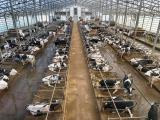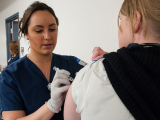Mar 21, 2007 (CIDRAP News) – World Health Organization (WHO) officials will propose new ideas about producing H5N1 avian influenza vaccines to Asian health ministers next week in Jakarta in the hope of resolving an impasse with Indonesia over sharing of virus samples, according to press reports.
The WHO said it would press pharmaceutical companies to expand vaccine manufacturing in developing nations to lower the cost of the vaccines to those countries, Bloomberg News reported today.
"Some companies might be able to transfer some of their bulk capacity to developing-country industries," David Heymann, WHO's acting director-general for communicable diseases, told Bloomberg, adding that the solution could take 10 years to achieve. He said WHO officials will discuss the plan with as many as 12 countries at the Mar 26 and 27 meeting in Jakarta.
In early February, Indonesia announced it would stop sharing H5N1 samples with the WHO because the government believes it is unfair for foreign countries to use the samples to develop vaccines that poor nations can't afford. The country also signed a memorandum of understanding with US vaccine producer Baxter International that laid the groundwork for future collaborations or supply agreements.
Unrestricted sharing of avian flu virus samples is vital to the research community for developing vaccines and monitoring the virus's evolution and global spread.
On Feb 16 Indonesian Health Minister Siti Fadilah Supari met with Heymann, and it appeared that Indonesia had agreed in principle to resume sharing its H5N1 samples. However, the agreement has not been finalized, and Supari announced on Mar 14 that Indonesia would not share any more samples until it has a "legally binding" guarantee that the samples won't be used to develop vaccines that the country couldn't afford.
Supari told reporters today that an inability of poor countries to access vaccines during an influenza pandemic could threaten world peace, Reuters reported. "If we want the world to be a harmonious place, the poor should be helped with the technology. If the situation remains like this, poor nations will become poorer, sicker, and more helpless," she said.
Heymann told Bloomberg that WHO Director-General Margaret Chan will meet with flu vaccine manufacturers after the Jakarta conference to discuss options for maintaining access to samples.
However, he told Canadian Press (CP) today that it is difficult to discuss access to vaccines when the world capacity for making them is so limited. The WHO has estimated the world's annual production capacity for trivalent flu vaccine at a maximum of about 350 million doses.
Despite this limited capacity, Heymann said his team could still make proposals to the developing nations that are concerned about access to vaccines, CP reported. One option is to create a "virtual stockpile" from supplies held back by vaccine producers that would be earmarked for use by developing countries in the early days of an emerging pandemic, he said.
See also:
Mar 14 CIDRAP News story "Indonesia wants legal pact on sharing H5N1 samples"


















